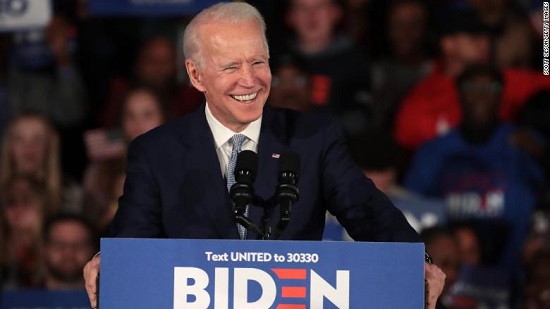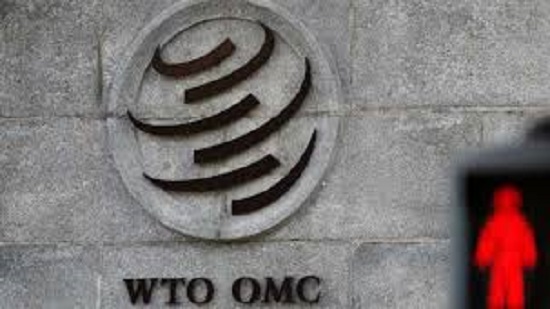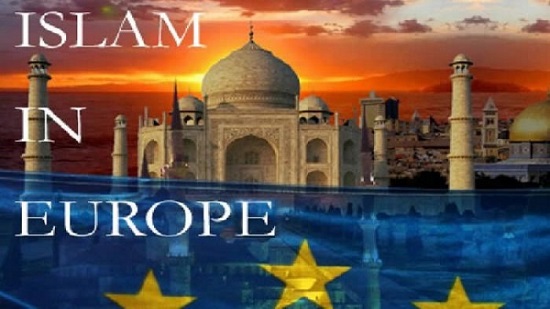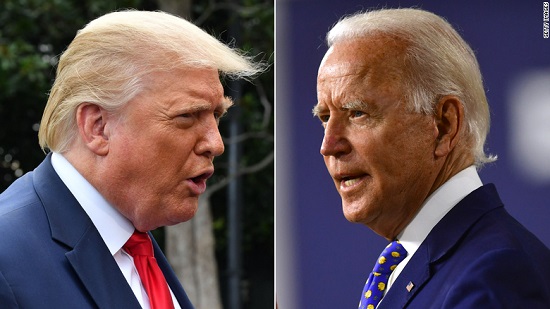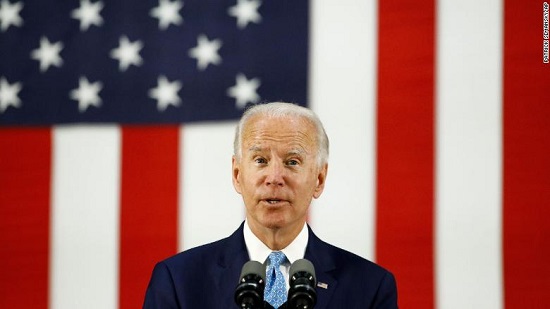Voters will be looking for more than just symbolism in Biden and Harris
For all of the distraction and uncertainty around this year s veepstakes, there was a certain air of inevitability around the selection of Sen. Kamala Harris as former Vice President Joe Biden s running mate, as confirmed in Wednesday s historic introduction of the full Democratic ticket.
With robust credentials and solid support from the party establishment, Harris who would be the first Black woman, the first Asian American and just the fourth woman on a major US party ticket, was the odds-on favorite nearly as soon as she suspended her own campaign. And with Biden becoming the presumptive Democratic nominee at a time of unprecedented consciousness around issues of race and gender, the practical and symbolic advantages of picking a younger, nonwhite woman as his running mate were clearly magnified.Biden held his VP announcement on the third anniversary of the march in Charlottesville, the horrific parade of torch-bearing white supremacists that Biden has cited as the primary motivation for his entry into the presidential race. "For me, it was a call to action," he said in his introduction of Harris. "At that moment I knew I couldn t standby and let Donald Trump, a man who went on to say... there were very fine people on both sides, ... continue to attack everything that makes America America."
But symbolism alone won t accomplish the campaign s critical goals if it wants to achieve, to quote Harris s words from Wednesday s speech, "we need more than a victory...we need a mandate."
The ticket needs to energize Black voters, who will be weighing Harris pioneering status against lingering criticisms of her record as California s "top cop." It needs to connect with young voters, who have seen the social contract of their parents and grandparents implode under the establishment politics of the decades in which they ve been alive. And it needs to bridge the jagged rift between the Democratic Party s centrists and its insurgent progressive wing, itself a fragmented mosaic of Bernie Sanders and Elizabeth Warren and yes, Andrew Yang and Tulsi Gabbard supporters, encompassing factions who prioritize class-based politics and those more focused on social equity and restorative justice.That s the challenge the newly unveiled running mates have ahead of them, one that s been amplified by the magnitude of the crises our country now faces. As Biden and Harris both underscored, this is a "life changing election for our nation" — one that will "decide the future of America for a very, very long time."
Harris, Biden said, was the right person to join in addressing this challenge: Smart, tough, experienced, a "proven fighter for the backbone of this country, the middle class," and ready to do the job of VP — or POTUS, if needed — on day one. He sought to present her prosecutorial history around the theme that Harris herself has returned to again and again, as a career spent fighting "for the people," echoing the phrase that Harris said time and again as San Francisco D.A.: "Kamala Harris, for the people." He also promised that she would be the sharp sword in the campaign s scabbard against Trump and Mike Pence, leveraging her background as a router of corruption and courtroom interrogator against the leaders of an administration that has repeatedly and gleefully flouted laws, standards and ethics.Yet still, in both Biden and Harris remarks, the historical significance of the moment came back again and again: "This morning, all across the nation, little girls woke up, especially little Black and brown girls that feel overlooked and undervalued in their communities, but today — today just maybe they re seeing themselves for the first time in a new way as president and vice presidents," Biden said.
As Harris famously said during the debate where she confronted Biden on his record regarding school busing to promote integration, "That little girl was me."
This is a moment that needs to be celebrated, among our Black and Asian communities and by all Americans, for what it is — emblematic evidence of the sea change in our nation s social fabric; a defiant rejection of the racist and misogynist themes that have been woven into America s political "conventional wisdom"; a statement of hope for more and greater inclusion in the future. We ve never been closer to having a Black woman VP than now. We ve never been closer to having an Asian VP than now. The likelihood that we ll see an Asian American president in my lifetime, something I would have found difficult to imagine just a few decades ago, is higher than it has ever been.
But getting there will require connecting this moment to the movements surging around it, movements that want real change, real soon.
Harris, in her acceptance speech, noted that the "civil rights struggle is nothing new to Joe ... And, today, he takes his place in the ongoing story of America s march toward equality and justice as the only who has served alongside the first Black president and has chosen the first Black woman as his running mate." The reality is that that struggle looks very different today than it did when President Barack Obama was elected in 2008. Today, there is a fiery hunger, as one friend on social media put it, for "transformation, not just representation." The kind of deep structural change being demanded isn t what might have sprung to mind when one imagined a Biden/Harris 2020 ticket in the earliest days of this electoral cycle. And yet, it s undoubtedly what s necessary, given the breadth and complexity of the crises this nation faces.
It s encouraging that Biden, in recent weeks, has embraced rhetoric and policies that reflect the influences of the Democratic Party s progressive wing — I even joked that I was getting excited by the seeming emergence of the chimera candidate "Joelizabeth Warden." It s also promising that Harris directly referenced the passion for social change that is the legacy of her parents, immigrants from India and from Jamaica who first connected at Bay Area rallies for civil rights. Harris talked about how her parents met "as students in the streets of Oakland, shouting for this thing called justice... My parents would bring me to protests strapped tightly in my stroller. And my mother, Shyamala, raised my sister Maya and me to believe that it was up to us and every generation of Americans to keep on marching."The symbolism of this ticket is undeniable. Voters, especially progressive voters, will now be looking for the substance behind it — how the ticket intends to address a pandemic that, as Harris noted, is killing an American every 80 seconds; how it will reform healthcare; how it will protect women s right to choose, root out systemic racism, protect voting rights and reaffirm this nation s commitment to immigrants.
As Harris acknowledged at the conclusion of her speech, "electing Joe Biden is just the start of the work ahead." We should celebrate this historic moment. And then get to work making Donald Trump history.








